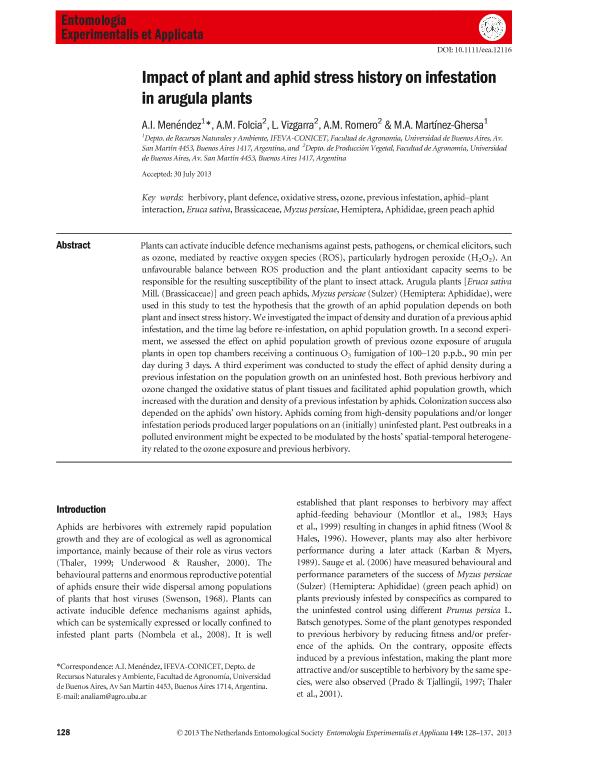Artículo
Impact of plant and aphid stress history on infestation in arugula plants
Fecha de publicación:
08/2013
Editorial:
Wiley
Revista:
Entomologia Experimentalis et Applicata
ISSN:
0013-8703
Idioma:
Inglés
Tipo de recurso:
Artículo publicado
Clasificación temática:
Resumen
Plants can activate inducible defence mechanisms against pests, pathogens, or chemical elicitors, such as ozone, mediated by reactive oxygen species (ROS), particularly hydrogen peroxide (H2O2). An unfavourable balance between ROS production and the plant antioxidant capacity seems to be responsible for the resulting susceptibility of the plant to insect attack. Arugula plants [Eruca sativa Mill. (Brassicaceae)] and green peach aphids, Myzus persicae (Sulzer) (Hemiptera: Aphididae), were used in this study to test the hypothesis that the growth of an aphid population depends on both plant and insect stress history. We investigated the impact of density and duration of a previous aphid infestation, and the time lag before re-infestation, on aphid population growth. In a second experiment, we assessed the effect on aphid population growth of previous ozone exposure of arugula plants in open top chambers receiving a continuous O3 fumigation of 100–120 p.p.b., 90 min per day during 3 days. A third experiment was conducted to study the effect of aphid density during a previous infestation on the population growth on an uninfested host. Both previous herbivory and ozone changed the oxidative status of plant tissues and facilitated aphid population growth, which increased with the duration and density of a previous infestation by aphids. Colonization success also depended on the aphids' own history. Aphids coming from high-density populations and/or longer infestation periods produced larger populations on an (initially) uninfested plant. Pest outbreaks in a polluted environment might be expected to be modulated by the hosts' spatial-temporal heterogeneity related to the ozone exposure and previous herbivory.
Palabras clave:
Herbivory
,
Plant Stress
,
Oxidative Stress
,
Aphids
Archivos asociados
Licencia
Identificadores
Colecciones
Articulos(IFEVA)
Articulos de INST.D/INV.FISIOLOGICAS Y ECO.VINCULADAS A L/AGRIC
Articulos de INST.D/INV.FISIOLOGICAS Y ECO.VINCULADAS A L/AGRIC
Articulos(OCA PQUE. CENTENARIO)
Articulos de OFICINA DE COORDINACION ADMINISTRATIVA PQUE. CENTENARIO
Articulos de OFICINA DE COORDINACION ADMINISTRATIVA PQUE. CENTENARIO
Citación
Menéndez, A. I.; Folcia, A. M.; Vizgarra, L.; Romero, Ana María; Martinez-Ghersa, Maria Alejandra; Impact of plant and aphid stress history on infestation in arugula plants; Wiley; Entomologia Experimentalis et Applicata; 149; 2; 8-2013; 128-137
Compartir




